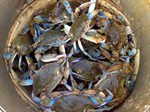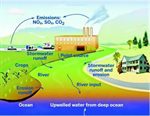

Crabs, supersized by carbon pollution, may upset Chesapeake’s balance
It is the dawn of the super crab.
Crabs are bulking up on carbon pollution that pours out of power plants, factories and vehicles and settles in the oceans, turning the tough crustaceans into even more fearsome predators.
That presents a major problem for the Chesapeake Bay, where crabs eat oysters. In a life-isn’t-fair






